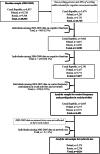Social networks and cognitive function in older adults: findings from the HAPIEE study
- PMID: 34663241
- PMCID: PMC8524850
- DOI: 10.1186/s12877-021-02531-0
Social networks and cognitive function in older adults: findings from the HAPIEE study
Abstract
Background: Social networks are associated with better cognitive health in older people, but the role of specific aspects of the social network remains unclear. This is especially the case in Central and Eastern Europe. This study examined associations between three aspects of the social network (network size of friends and relatives, contact frequency with friends and relatives, and social activity participation) with cognitive functions (verbal memory, learning ability, verbal fluency, processing speed, and global cognitive function) in older Czech, Polish, and Russian adults.
Methods: Linear regression estimated associations between baseline social networks and cognitive domains measured at both baseline and follow-up (mean duration of follow-up, 3.5 ± 0.7 years) in 6691 participants (mean age, 62.2 ± 6.0 years; 53.7% women) from the Health, Alcohol and Psychosocial factors In Eastern Europe (HAPIEE) study.
Results: Cross-sectional analyses, adjusted for country, age, and sex, showed positive associations of global cognitive function with social activity participation and network size of friends and relatives, but not with contact frequency in either network. Further adjustment for sociodemographic, behavioural, and health characteristics attenuated the associations with network size of relatives (P-trend = 0.074) but not with network size of friends (P-trend = 0.036) or social activities (P-trend< 0.001). In prospective analyses, network size and social activity participation were also linked with better cognition in simple models, but the associations were much stronger for social activities (P-trend< 0.001) than for network size of friends (P-trend = 0.095) and relatives (P-trend = 0.425). Adjustment for baseline cognition largely explained the prospective associations with network size of friends (P-trend = 0.787) and relatives (P-trend = 0.815), but it only slightly attenuated the association with social activities (P-trend< 0.001). The prospective effect of social activities was largely explained by sociodemographic, health behavioural, and health covariates (P-trend = 0.233). Analyses of specific cognitive domains generally replicated the cross-sectional and prospective findings for global cognitive function.
Conclusions: Older Central and Eastern European adults with larger social networks and greater social activities participation had better cognitive function, but these associations were stronger at baseline than over the short-term follow-up.
Keywords: Ageing; Cognitive decline; Cognitive function; Czech Republic; Poland; Russia; Social networks; Social relationships.
© 2021. The Author(s).
Conflict of interest statement
None declared.
Figures
Similar articles
-
Congruent relations between perceived neighbourhood social cohesion and depressive symptoms among older European adults: An East-West analysis.Soc Sci Med. 2019 Sep;237:112454. doi: 10.1016/j.socscimed.2019.112454. Epub 2019 Jul 29. Soc Sci Med. 2019. PMID: 31376532 Free PMC article.
-
Serum folate, vitamin B-12 and cognitive function in middle and older age: The HAPIEE study.Exp Gerontol. 2016 Apr;76:33-8. doi: 10.1016/j.exger.2016.01.011. Epub 2016 Jan 22. Exp Gerontol. 2016. PMID: 26808046 Free PMC article.
-
The prospective association between frequency of contact with friends and relatives and quality of life in older adults from Central and Eastern Europe.Soc Psychiatry Psychiatr Epidemiol. 2020 Aug;55(8):1001-1010. doi: 10.1007/s00127-020-01834-8. Epub 2020 Feb 10. Soc Psychiatry Psychiatr Epidemiol. 2020. PMID: 32040668 Free PMC article.
-
Folic acid supplementation and malaria susceptibility and severity among people taking antifolate antimalarial drugs in endemic areas.Cochrane Database Syst Rev. 2022 Feb 1;2(2022):CD014217. doi: 10.1002/14651858.CD014217. Cochrane Database Syst Rev. 2022. PMID: 36321557 Free PMC article.
-
Behavioural modification interventions for medically unexplained symptoms in primary care: systematic reviews and economic evaluation.Health Technol Assess. 2020 Sep;24(46):1-490. doi: 10.3310/hta24460. Health Technol Assess. 2020. PMID: 32975190 Free PMC article.
Cited by
-
Measuring the age-friendliness of cities in the Russian Federation: The translation, validation and application of the age-friendly cities and communities Questionnaire in the city of Kazan.Heliyon. 2024 Dec 10;11(1):e41100. doi: 10.1016/j.heliyon.2024.e41100. eCollection 2025 Jan 15. Heliyon. 2024. PMID: 39807523 Free PMC article.
-
Correlation between air pollution and cognitive impairment among older individuals: empirical evidence from China.BMC Geriatr. 2023 Sep 15;23(1):366. doi: 10.1186/s12877-023-03932-z. BMC Geriatr. 2023. PMID: 37710153 Free PMC article.
-
Association Between Social Network and Cognitive Function: A Cross-Sectional Assessment From the Cardiovascular and Metabolic Diseases Etiology Research Center Cohort (2013-2018).Front Psychiatry. 2022 Jun 6;13:893290. doi: 10.3389/fpsyt.2022.893290. eCollection 2022. Front Psychiatry. 2022. PMID: 35733804 Free PMC article.
-
Investigating Heterogeneity in the Relationship Between Marital Satisfaction and Cognitive Health by Gender and Across the Cognitive Function Distribution.Innov Aging. 2023 Jul 26;7(7):igad079. doi: 10.1093/geroni/igad079. eCollection 2023. Innov Aging. 2023. PMID: 37727598 Free PMC article.
-
Social support and cognitive function in Chinese older adults who experienced depressive symptoms: is there an age difference?Front Aging Neurosci. 2023 May 12;15:1175252. doi: 10.3389/fnagi.2023.1175252. eCollection 2023. Front Aging Neurosci. 2023. PMID: 37251805 Free PMC article.
References
-
- Kuiper JS, Zuidersma M, Zuidema SU, Burgerhof JGM, Stolk RP, Oude Voshaar RC, et al. Social relationships and cognitive decline: a systematic review and meta-analysis of longitudinal cohort studies. Int J Epidemiol. 2016;45:1169–1206. - PubMed
-
- Kelly ME, Duff H, Kelly S, McHugh Power JE, Brennan S, Lawlor BA, et al. The impact of social activities, social networks, social support and social relationships on the cognitive functioning of healthy older adults: A systematic review. Syst Rev. 2017;6(1):259. doi: 10.1186/s13643-017-0632-2. - DOI - PMC - PubMed
Publication types
MeSH terms
Grants and funding
LinkOut - more resources
Full Text Sources


